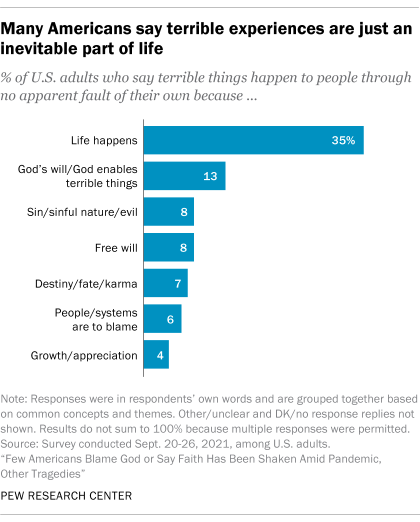
A global pandemic that has killed millions and disrupted lives and livelihoods around the world. A changing climate that has been linked with powerful hurricanes and raging wildfires. And countless individuals coping with other struggles big and small, personal and societal. These events have brought renewed relevance to an age-old question: Why is there so much suffering and evil in the world? This question can be particularly confounding for those who believe in a good and all-powerful God, as is often described in the Abrahamic religious traditions of Judaism, Christianity and Islam. For centuries, philosophers and theologians have grappled with this “problem of evil.”

Now, Pew Research Center has asked everyday Americans for their thoughts. The survey asked a nationally representative sample of 6,485 people: “In your own words, why do you think terrible things happen to people through no apparent fault of their own?” In response, 5,280 offered written responses, short and long, simple and complex. We then sorted the responses into several categories.
Among U.S. adults, 35% see suffering as random and nearly inescapable; many wrote that life (or another four-letter word) just “happens.” More than one-in-ten attributed human misfortune to God’s will. Smaller shares touched on the themes of free will, sin and evil, Satan, fate, or people and social systems. Still others saw a silver lining to hardship, describing it as an opportunity for growth and perspective. And some responses addressed multiple themes. We’ve compiled a small selection of these responses below.